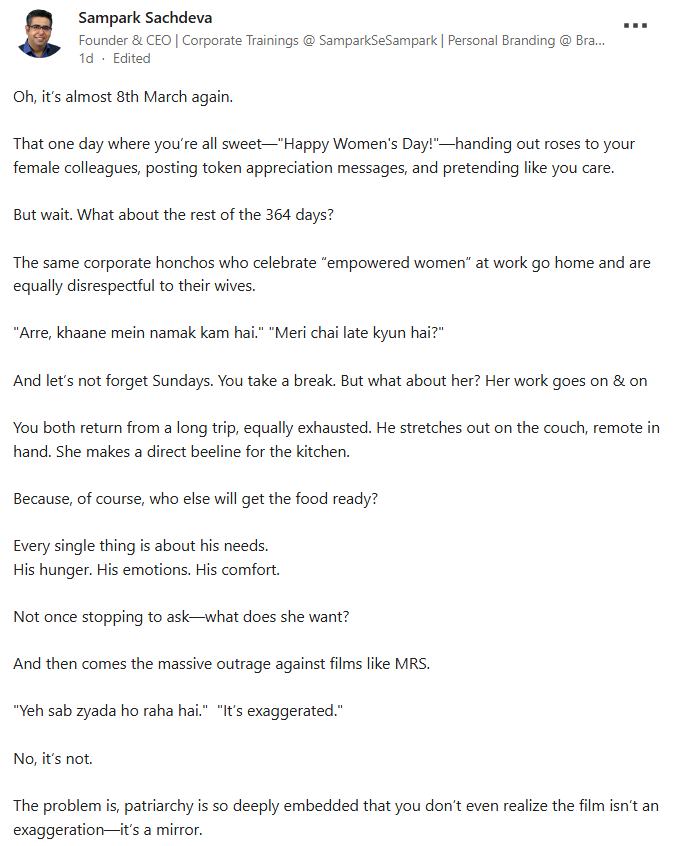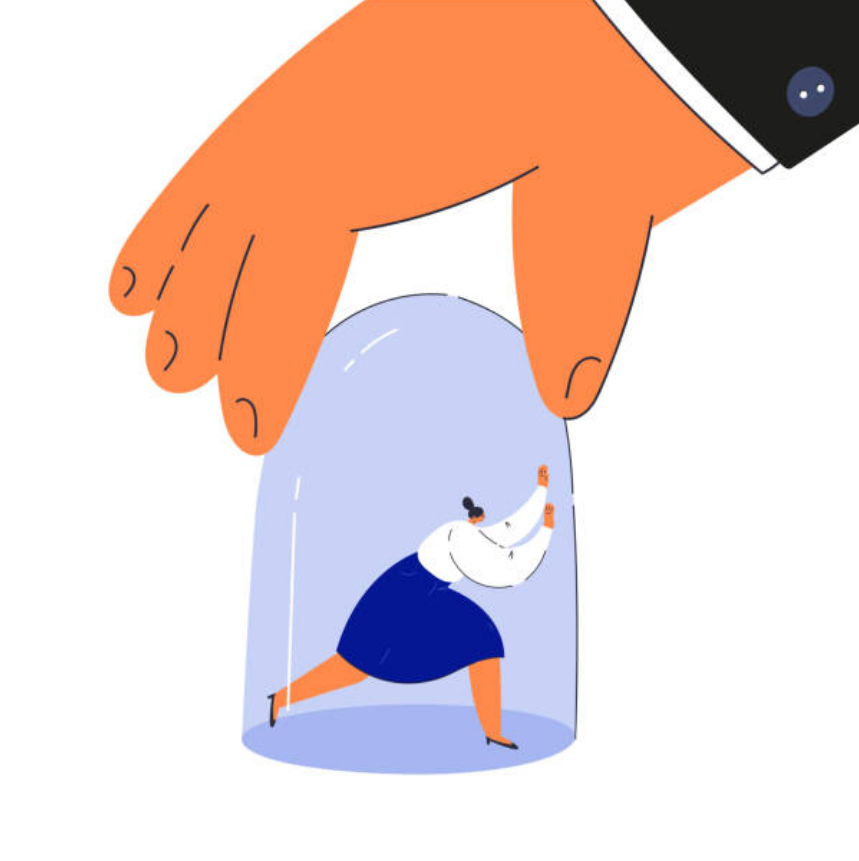
Every year, as March 8th approaches, the world gears up to celebrate International Women's Day. Roses are handed out, social media floods with hashtags like #GirlPower and #WomenEmpowerment, and corporations roll out their pink-branded merchandise, mugs, tote bags, and cupcakes adorned with ‘Boss Babe’ in cursive. But let's be honest: what does any of this actually achieve?
Women's Day was first celebrated in 1911, a time when women were fighting for basic rights like voting and fair wages. Over a century later, in 2025, we're still stuck in a loop of performative gestures and hollow symbolism. The day has become a corporate gimmick, a superficial pat on the back that does little to address the systemic inequalities women face every single day.
Recently, I came across a thought-provoking post by Sampark Sachdeva, the founder of SamparkSeSampark and an angel investor, who captured the essence of this issue perfectly. He said, "Women's Day should be banned if it's all just gimmicky, superficial tokenism." His words struck me hard because they reflect the grim reality that so many of us, men, women, and society in general, have conveniently chosen to ignore. Women's Day shouldn't be a day of hollow celebrations. If it's all just about giving flowers and posting token appreciation messages, nothing will change. Not tomorrow, not next year, not ever.

The same corporate leaders who hand out roses and post empowering messages on Women's Day often go home to perpetuate the very patriarchy they claim to oppose. Sachdeva's LinkedIn post hits the nail on the head: "Arre, khaane mein namak kam hai. Meri chai late kyun hai?" The entitlement is staggering. After a long trip, while the man stretches out on the couch with the remote, the woman heads straight to the kitchen. Why? Because, of course, who else will get the food ready?
This isn't just about household chores; it's about the ingrained belief that a woman's primary role is to serve. It's about the 'Raja Beta Syndrome,' where mothers raise sons who never lift a plate or pour their own glass of water. These sons grow up believing they are above everyone else, perpetuating a cycle of inequality. As Sachdeva notes, "We're still a society obsessed with having sons. 'Beta chahiye. Waris chahiye.' Daughters? 'Paraya dhan.'"

As a man who considers himself a feminist, I’ve watched the annual spectacle of ‘appreciation’ on March 8, with roses, cupcakes, and feel-good Instagram posts. Yet by March 9, everything snaps back to ‘normal.’ Women I’ve spoken to are exhausted by these hollow gestures.
Flowers? A badge? A pink cupcake? What a wonderful way to make my day! Clap clap, let’s all cheer—nothing changes again this year.
This isn’t sarcasm, it’s a critique of performative activism. Pink cupcakes may momentarily soothe our consciences, but they do nothing to address the real issues like equal pay, workplace discrimination, or unpaid labour. We offer symbolic gestures while avoiding the real, systemic change that’s needed, refusing to confront our complicity in perpetuating inequality.
The corporate world is no better. Despite all the talk of diversity and inclusion, women continue to face pay gaps and promotion discrimination. Sachdeva, who has firsthand experience in sales, highlights the blatant sexism: "Sales needs aggressive people—I only want boys." HR may push for diversity, but the resistance is real. "Arre, then I'll have to go easy on them. That's not how sales works," is the common refrain.

This isn't just about numbers on a paycheck; it's about the systemic barriers that prevent women from reaching their full potential. It's about the assumption that women won't push themselves, that they're somehow less capable. And let's not forget the pinkwashing, big discounts and pop-up sales that derail meaningful conversations about financial independence and investment.
Don't Miss: International Women's Day 2025: 9 Bollywood Films That Show Women As The Un-Weaker Sex
Films like 'MRs' and ‘Thappad’ often face backlash for being ‘exaggerated.’ But as Sachdeva argues, "The problem is, patriarchy is so deeply embedded that you don't even realise the film isn't an exaggeration, it's a mirror." The outrage against such films is a reflection of our discomfort with confronting the harsh realities of gender inequality.
The Uttarakhand High Court's recent decision to mandate the registration of live-in relationships under the Uniform Civil Code (UCC) is another example of the state's overreach into personal lives. Instead of protecting women, it opens the door to surveillance and control. Every obvious ruse to regain control of women who make their own choices comes disguised as concern for their well-being.

If we genuinely want to celebrate Women’s Day, we need to move beyond tokenism. We need to address the root causes of inequality—whether it’s the pay gap, the lack of childcare support, or the societal expectations that confine women to traditional roles. We need to raise sons who respect women, not just on March 8, but every day of the year.
Women’s Day celebrations are fine, but real change will happen only when they start listening to women. It’s time to stop clapping and start acting. It’s time to move beyond the roses and the pink cupcakes and focus on creating a world where women are truly equal, not just on paper, but in practice.
So, this Women’s Day, let’s ask ourselves: Are we ready to challenge patriarchy, or are we content with another year of empty gestures?
Don't Miss: 8+ Sexist Comments Women Are Tired of Hearing: Let's Change This On Women’s Day 2025
For more such stories, stay tuned to HerZindagi.
Image Courtesy: Freepik
Also watch this video
Herzindagi video
Our aim is to provide accurate, safe and expert verified information through our articles and social media handles. The remedies, advice and tips mentioned here are for general information only. Please consult your expert before trying any kind of health, beauty, life hacks or astrology related tips. For any feedback or complaint, contact us at [email protected].